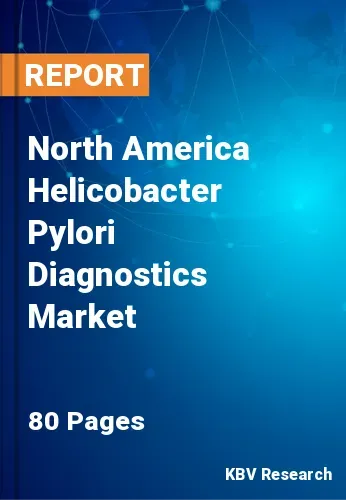The North America Helicobacter Pylori Diagnostics Market would witness market growth of 4.8% CAGR during the forecast period (2023-2030).
Helicobacter pylori (H. pylori) is a bacterium that infects the stomach and is linked to several gastrointestinal conditions, including gastritis and peptic ulcer disease. The diagnosis of H. pylori infection can be made using various techniques, including a breath test, a stool antigen test, and a quick urease test. Helicobacter pylori, a kind of bacteria, can infect the small intestine and the stomach. Gastritis (inflammation of the stomach lining), peptic ulcers (sores in the stomach or duodenum), and in rare instances, stomach cancer are all brought on by H. pylori. Infection with H. pylori frequently causes stomach pain, nausea, vomiting, appetite loss, and weight loss.
These infections are most common in developing nations. Hundreds of millions experience peptic ulcers at some point in their lives, and tens of millions of those may eventually develop stomach cancer. Direct contact between family members, tainted water, and infected food are all potential ways that H. pylori might spread. It is essential to take quick action against this bacterial infection and establish a plan to avoid it because the high frequency of infection occurs primarily in developing nations and because the test-and-treat technique places a tremendous economic burden on many of these countries.
In 2020, there were reported 9126 cases of infectious syphilis, for a rate of 24 per 100,000 people. In the last five years (2016 to 2020), the rate of infectious syphilis among females has increased by 740 percent, while the rate among males has increased by 70 percent. Nationally, infectious syphilis has increased by 124% from 2016 to 2020. In almost every province and territory (except New Brunswick and Nunavut), syphilis infection rates have increased. As helicobacter pylori diagnostics are also recommended for diagnosing syphilis, their growing cases are expected to increase the utilization of helicobacter pylori diagnostics methods, thus aiding the market growth in North America.
The US market dominated the North America Helicobacter Pylori Diagnostics Market by Country in 2022, and would continue to be a dominant market till 2030; thereby, achieving a market value of $215.1 Million by 2030. The Canada market is poised to grow at a CAGR of 7.2% during (2023 - 2030). Additionally, The Mexico market would witness a CAGR of 6.3% during (2023 - 2030).
Based on Test Type, the market is segmented into Non-invasive and Invasive. Based on End User, the market is segmented into Diagnostics Laboratories, Hospitals, and Others. Based on Method, the market is segmented into Laboratory Based Test and Point of Care Test. Based on countries, the market is segmented into U.S., Mexico, Canada, and Rest of North America.
Free Valuable Insights: The Worldwide Helicobacter Pylori Diagnostics Market is Projected to reach USD 805.9 Million by 2030, at a CAGR of 5.5%
The market research report covers the analysis of key stake holders of the market. Key companies profiled in the report include Cardinal Health, Inc., Biohit Oyj, Abbott Laboratories, Quidel Corporation, Gulf Coast Scientific, Inc. (Gulf Coast Medical Center), Meridian Bioscience, Inc. (SD Biosensor Co., Ltd.), Avanos Medical, Inc., Thermo Fisher Scientific, Inc., Bio-Rad Laboratories, Inc. and F. Hoffmann-La Roche Ltd.
By Test Type
By End User
By Method
By Country

Our team of dedicated experts can provide you with attractive expansion opportunities for your business.

